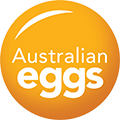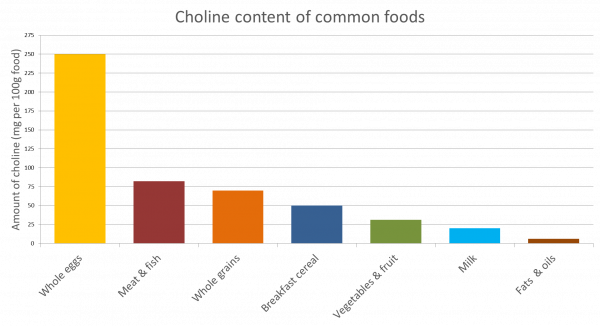
Choline: The Forgotten Nutrient in Eggs
References:
- Probst, Y, et. al. Development of a Choline Database to Estimate Australian Population Intakes. Nutrients 2019, 11, 913.
- Petersen JM, Parker SE, Crider KS, Tinker SC, Mitchell AA, Werler MM. One-Carbon Cofactor Intake and Risk of Neural Tube Defects Among Women Who Meet Folic Acid Recommendations: A Multicenter Case-Control Study. Am J Epidemiol 2019;188:1136-43.
- Maija P T Ylilauri, Sari Voutilainen, Eija Lönnroos, Heli E K Virtanen, Tomi-Pekka Tuomainen, Jukka T Salonen, Jyrki K Virtanen, Associations of dietary choline intake with risk of incident dementia and with cognitive performance: the Kuopio Ischaemic Heart Disease Risk Factor Study, The American Journal of Clinical Nutrition, Volume 110, Issue 6, December 2019, Pages 1416–1423,
- Blusztajn, J.K., Slack, B.E. & Mellott, T.J. Neuroprotective Actions of Dietary Choline. Nutrients 9(2017).
- Wallace TC. A Comprehensive Review of Eggs, Choline, and Lutein on Cognition Across the Life-span. J Am Coll Nutr. 2018 May-Jun;37(4):269-285. doi: 10.1080/07315724.2017.1423248.
Liu L, Qiao S, Zhuang L, et al. Choline Intake Correlates with Cognitive Performance among Elder Adults in the United States. Behav Neurol. 2021;2021:2962245. Published 2021 Oct 29. doi:10.1155/2021/2962245
Obeid, R., Derbyshire, E., & Schön, C. (2022). Association between maternal choline, foetal brain development and child neurocognition; systematic review and meta-analysis of human studies. Advances in nutrition (Bethesda, Md.), nmac082. Advance online publication. https://doi.org/10.1093/advances/nmac082
Yuan, J., Liu, X., Liu, C., Ang, A., Massaro, J., Devine, S. A., Auerbach, S. H., Blusztajn, J. K., Au, R., & Jacques, P. F. (2022). Is dietary choline intake related to dementia and Alzheimer's disease risk: results from the Framingham Heart Study. The American journal of clinical nutrition, nqac193. Advance online publication. https://doi.org/10.1093/ajcn/nqac193
- Lee, C.W., Galvan, E., Lee, T.V. et al. Low Intake of Choline Is Associated with Diminished Strength and Lean Mass Gains in Older Adults. J Frailty Aging (2022). https://doi.org/10.14283/jfa.2022.50
- U.S. Department of Agriculture. USDA Database for the Choline Content of Common Foods Release Two, online document [Accessed 21 July 2019]. 2008.
- National Health and Medical Research Council; Australian Government Department of Health and Ageing; New Zealand Ministry of Health. NHMRC Nutrient Reference Values for Australia and New Zealand, online document [Accessed 20 Jul 2019]. 2006 (updated 2017).
Cheatham, C.L. Nutritional Factors in Fetal and Infant Brain Development. Ann. Nutr. Metab. 2019, 75 (Suppl. 1), 20–32.
Green, T., Best, K., Gould, J.F., & Makrides, M. Eggs to Improve Choline Intakes in Pregnancy? Providing the Evidence. SAHMRI Women & Kids Final Project Report for Australian Eggs. Unpublished (2022).
Christifano DN, Chollet-Hinton L, Hoyer D, Schmidt A, Gustafson KM. Intake of eggs, choline, lutein, zeaxanthin, and DHA during pregnancy and their relationship to fetal neurodevelopment. Nutr Neurosci. 2022 Jun 17:1-7. doi: 10.1080/1028415X.2022.2088944.
- Caudill MA, Strupp BJ, Muscalu L, Nevins JEH, Canfield RL. Maternal choline supplementation during the third trimester of pregnancy improves infant information processing speed: a randomized, double-blind, controlled feeding study. FASEB J 2018;32:2172-80.
- Mun JG, Legette LL, Ikonte CJ, Mitmesser SH. Choline and DHA in Maternal and Infant Nutrition: Synergistic Implications in Brain and Eye Health. Nutrients 2019;11.
- Irvine, N., England-Mason, G., Field, C. J., Dewey, D., & Aghajafari, F. (2022). Prenatal Folate and Choline Levels and Brain and Cognitive Development in Children: A Critical Narrative Review. Nutrients, 14(2), 364. https://doi.org/10.3390/nu14020364
- Christifano DN, Chollet-Hinton L, Hoyer D, Schmidt A, Gustafson KM. Intake of eggs, choline, lutein, zeaxanthin, and DHA during pregnancy and their relationship to fetal neurodevelopment. Nutr Neurosci. 2022 Jun 17:1-7. doi: 10.1080/1028415X.2022.2088944.
- Fulgoni VL & Papanikolaou 2020. Modeling the Removal and Addition of Eggs in the Current US Diet is Linked to Choline and Lutein + Zeaxanthin Usual Intakes in Childhood. Current Developments in Nutrition 10.1093/cdn/nzaa181
Papanikolaou Y, Fulgoni VL 3rd. Increasing Egg Consumption at Breakfast Is Associated with Increased Usual Nutrient Intakes: A Modeling Analysis Using NHANES and the USDA Child and Adult Care Food Program School Breakfast Guidelines. Nutrients. 2021 Apr 20;13(4):1379. doi: 10.3390/nu13041379.
Papanikolaou Y, Fulgoni VL 3rd. Egg Consumption in U.S. Children is Associated with Greater Daily Nutrient Intakes, including Protein, Lutein + Zeaxanthin, Choline, α-Linolenic Acid, and Docosahexanoic Acid. Nutrients. 2019 May 22;11(5):1137. doi: 10.3390/nu11051137
Papanikolaou Y, Fulgoni VL 3rd. Eggs Are Cost-Efficient in Delivering Several Shortfall Nutrients in the American Diet: A Cost-Analysis in Children and Adults. Nutrients. 2020 Aug 11;12(8):2406. doi: 10.3390/nu12082406.
- Liu L, Qiao S, Zhuang L, Xu S, Chen L, Lai Q, Wang W. Choline Intake Correlates with Cognitive Performance among Elder Adults in the United States. Behav Neurol. 2021 Oct 29;2021:2962245. doi: 10.1155/2021/2962245.
- de Wilde MC, Vellas B, Girault E, Yavuz AC, Sijben JW. Lower brain and blood nutrient status in Alzheimer's disease: Results from meta-analyses. Alzheimers & Dementia (New York, NY) 2017;3:416-31.
- Chuang SY, Lo YL, Wu SY, Wang PN, Pan WH. Dietary Patterns and Foods Associated With Cognitive Function in Taiwanese Older Adults: The Cross-sectional and Longitudinal Studies. Journal of the American Medical Directors Association 2019;20:544-50.e4
- Oyen J, Gjesdal CG, Karlsson T, et al. Dietary Choline Intake Is Directly Associated with Bone Mineral Density in the Hordaland Health Study. The Journal of Nutrition (Norway) 2017;147:572-8.
- Gao X, Wang Y, Randell E, et al. Higher Dietary Choline and Betaine Intakes Are Associated with Better Body Composition in the Adult Population of Newfoundland, Canada. PloS One 2016;11:e0155403.
 >
> 












